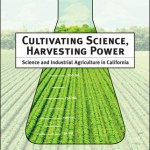Power
Pt. I | Pt. 2 | Pt. 3 | Pt. 4
---
Part 2 with Christopher Henke, discussing his book Cultivating Science, Harvesting Power, follows below. All entries in the author-meets-blogger series can be found here.
WF: Now I can get back to the interpretive framework and your own concepts when understanding your empirical evidence. "Repair" is a guiding framework for you here, a way of approaching, understanding, and explaining your research findings. So what do you mean, repair?
CH: We use the term repair in everyday life to describe the process of fixing things---sociologists use repair as a…
The World's Fair is pleased to offer the following discussion about Cultivating Science, Harvesting Power: Science and Industrial Agriculture in California (MIT Press, 2008), with its author Christopher Henke. Henke is an assistant professor of sociology at Colgate University, an STS scholar, and a contributor to Colgate's environmental studies program.
Cultivating Science, Harvesting Power, says its publisher, "explores the ways that science helped build the Salinas Valley and California's broader farm industry." In doing so, Henke provides an account of "how agricultural scientists and…
I said I would come back to this, and I am. I am a man of my word. Yesterday, I posted a link to a video of this really cool water rocket thingy.
How does this work? What is the physics going on here? I think this can be best explained with the momentum principle.
Let me start by pretending like I have some object that shoots out a piece of water (or really it could be anything). Also, let me pretend like this is in space ore something where there are no external forces.
Above is a before and after picture. Initially, there is something (the box) with water inside. Through some process…
I just can't pass this up. One of the chemistry majors had a complaint with the power company. After an unusually high previous power bill, they checked the electric meter half way through the month. The meter said they had used 90,000 kilowatt-hrs of electricity. That is a lot of energy. It is also a lot of money. If I estimate 10 cents per kilowatt hour (the prices varies in space and time), this would be a $9,000 bill.
So, what is the deal? Is it a broken electric meter? Could be. If it is not, maybe it is a short. Shorts usually blow a fuse, but if it were an older house, could…
Here is an article from Wired.com that talks about a used cooking oil generator. It's a really neat idea in that the oil is right there anyway. Here is my problem - from the article:
A new garage-engineered generator burns the waste oil from restaurants' deep fryers to generate electricity and hot water. Put 80 gallons of grease into the Vegawatt each week, and its creators promise it will generate about 5 kilowatts of power.
If you put 80 gallons of grease into the thing, that has a finite amount of energy. 5 kilowatts tells you the rate the energy is created. This would be like saying "…
This comes from Buzz Out Loud Episode 865 which got the story from Slashdot regarding a possible new technology that would use piezoelectric devices to charge cell phones while you talk. The original article the slashdot story pointed to talked mostly about the advances in piezoelectric devices, but I want to look at the possibility that sound could charge a phone.
First for the basic physics. How do you make sound and what is it? Sound is a compression wave in the air. To make a sound you need something to push the air (yes, I simplified this quite a bit). When that something pushes the…
Gas prices may be trending down, but they are still quite high. How can we save gas? One of my colleagues suggested we can save gas by getting rid of all drive throughs. This means it is my job to estimate how much could be saved.
**Starting Assumptions (estimations)**
How many drive-throughs are there in the U.S.A.? When I think of drive-throughs, I think of McDonalds. [Wikipedia](http://en.wikipedia.org/wiki/Mcdonalds) says there are 31,000 restaurants world wide. I am going to say there are around 20,000 in the U.S. that have drive-throughs. So then, how many total drive-throughs?…
Which wastes more fuel? (and thus produces more carbon dioxide). This is a difficult to question to answer for a variety of reasons. The main reason is that a speed change from 71 mph to 70 mph is different than a reduction from 56 to 55 mph.
First, let me be clear that the question of how much fuel is wasted using daytime running lights (or DRL as they are called) has already been addressed. The first source I found was howstuffworks.com
**Assumptions**
The daytime running lights on a car run at about 100 watts (for the pair)
The energy density of gasoline is 1.21 x 108 Joules/gallon.
A car…
While taking organic chemistry, most people end up learning about octane ratings. If gasoline burns too fast, engine knock occurs. A number of factors influence this, the easiest of which to appreciate is branching. By definition, so-called "isooctane" (the structure of which I didn't even realize was the below until today) has an octane rating of 100.
n-heptane has one of 0. 87% isooctane, 13% n-heptane would give you an octane rating the same as regular gas (but wouldn't make very good gasoline, for reasons to be discussed another time...
High octane fuels won't give you better mileage or…
